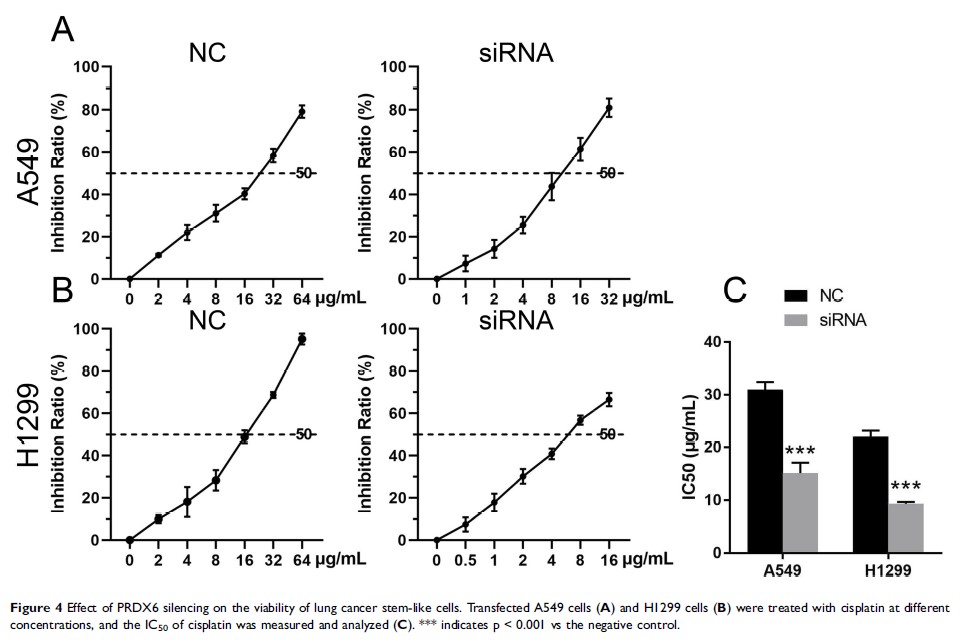109229
论文已发表
注册即可获取德孚的最新动态
IF 收录期刊
- 3.4 Breast Cancer (Dove Med Press)
- 3.2 Clin Epidemiol
- 2.6 Cancer Manag Res
- 2.9 Infect Drug Resist
- 3.7 Clin Interv Aging
- 5.1 Drug Des Dev Ther
- 3.1 Int J Chronic Obstr
- 6.6 Int J Nanomed
- 2.6 Int J Women's Health
- 2.9 Neuropsych Dis Treat
- 2.8 OncoTargets Ther
- 2.0 Patient Prefer Adher
- 2.2 Ther Clin Risk Manag
- 2.5 J Pain Res
- 3.0 Diabet Metab Synd Ob
- 3.2 Psychol Res Behav Ma
- 3.4 Nat Sci Sleep
- 1.8 Pharmgenomics Pers Med
- 2.0 Risk Manag Healthc Policy
- 4.1 J Inflamm Res
- 2.0 Int J Gen Med
- 3.4 J Hepatocell Carcinoma
- 3.0 J Asthma Allergy
- 2.2 Clin Cosmet Investig Dermatol
- 2.4 J Multidiscip Healthc

过氧化物还原酶 6 在非小细胞肺癌中的差异表达及对耐药性和肿瘤干细胞样特性的影响
Authors Xu J, Su Q, Gao M, Liang Q, Li J, Chen X
Received 4 April 2019
Accepted for publication 21 October 2019
Published 2 December 2019 Volume 2019:12 Pages 10477—10486
DOI https://doi.org/10.2147/OTT.S211125
Checked for plagiarism Yes
Review by Single-blind
Peer reviewers approved by Ms Shreya Arora
Peer reviewer comments 2
Editor who approved publication: Dr William Cho
Objective: Cancer stem-like cells (CSC) are thought to be involved in the cisplatin resistance of tumors. This study was designed to investigate the effect of PRDX6 on CSCs present in cisplatin-resistant non-small cell lung cancer (NSCLC) tumors.
Materials and methods: CD133+/ABCG2+ H1299 CSCs and A549 CSCs were isolated. The IC50 values for cisplatin in treatment of CSCs were detected using the CCK8 assay. Then the isolated cells were identified using CD133. Wnt/β-catenin expression was evaluated by Western blot assays. Specimens of tumor and adjacent para-carcinoma tissue were collected from 30 NSCLC patients and examined by immunohistochemistry (IHC), qRT-PCR, and Western blotting to determine and compare their levels of PRDX6 and CD133 expression. Finally, siRNA-mediated silencing of PRDX6 was employed with both types of CSCs to determine the impact of PRDX6 on CD133 enrichment by flow cytometry, cell viability, and sphere formation ability.
Results: High levels of PRDX6 and CD133 expression were detected in samples of tumor tissue from NSCLC patients, and expression of PRDX6 and CD13 presented a positive relationship. Increasing levels of cisplatin resistance and upregulated levels of PRDX6, ABCG2, Wnt, and β-catenin expression were detected in CD133+/ABCG2+ H1299 and A549 CSCs. Transfection with siRNA targeting PRDX6 changed these cellular characteristics by decreasing the levels of PRDX6, ABCG2, Wnt, and β-catenin expression. We further demonstrated that exogenous silencing of PRDX6 effectively inhibited the sphere formation ability of CSCs and re-sensitized them to cisplatin.
Conclusion: Our results strongly suggest that PRDX6 promotes cisplatin resistance in human lung cancer cells by promoting the stem-like properties of cancer cells. Our findings also suggest PRDX6 as a target for treating cisplatin resistant NSCLC.
Keywords: PRDX6, CSCs, cisplatin-resistance, NSCLC, cancer stem-like cell
